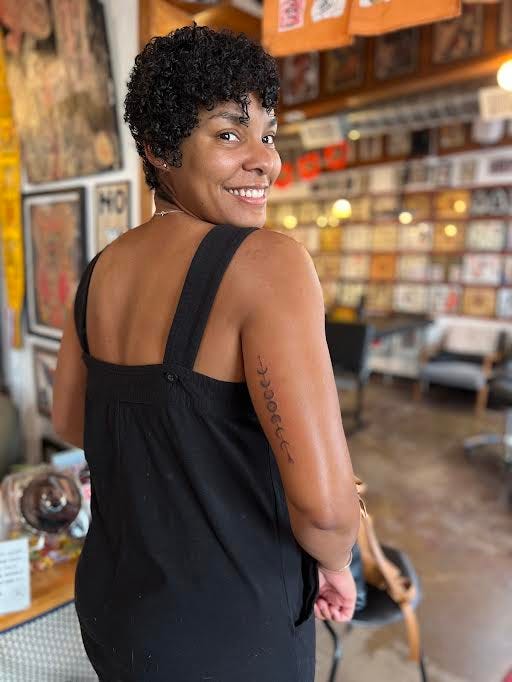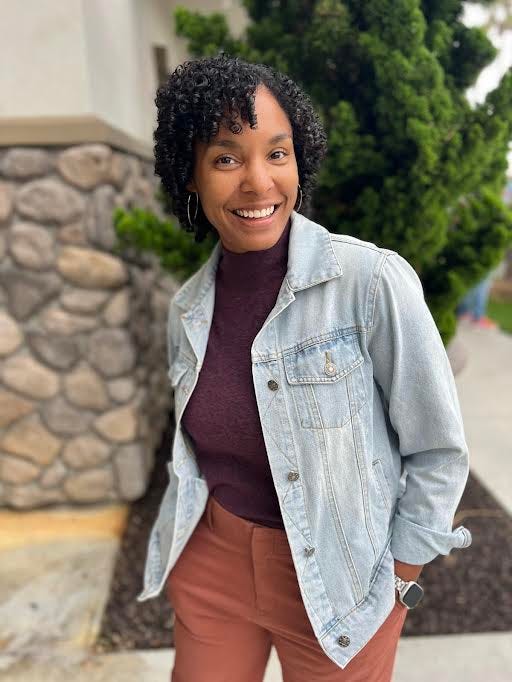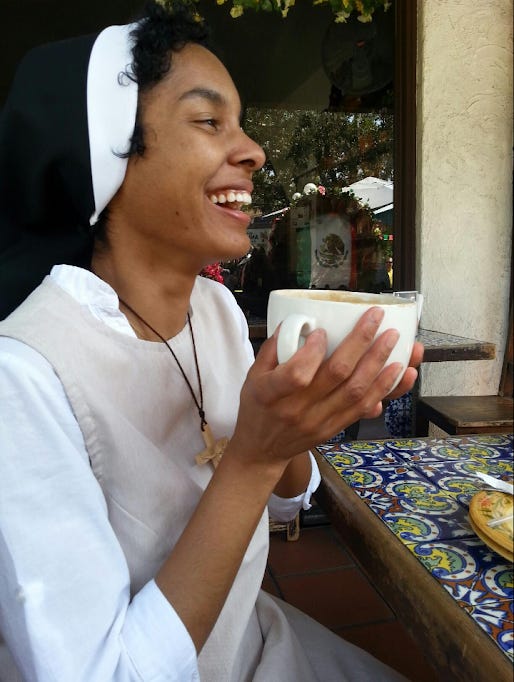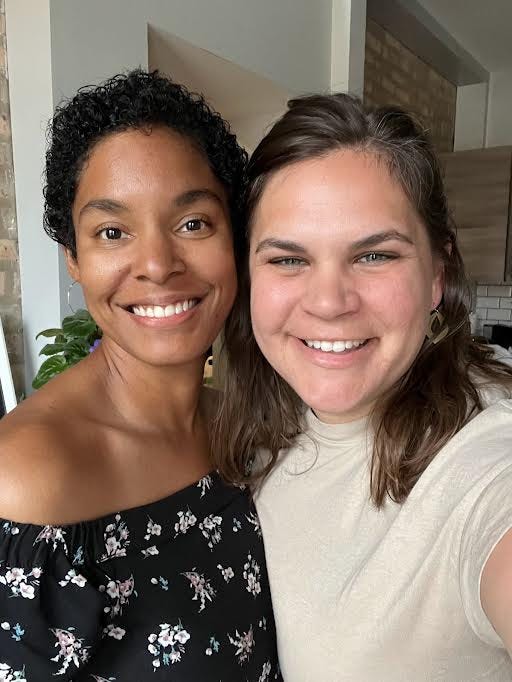Finding The Plot: Leaving the convent and finally accepting herself
"I can be good, and I can live a holy life, and I can be with a woman."
Desiré Findlay grew up Catholic, with a lot of the same cultural references and experiences most of us Millennials have. She took dance lessons, dated boys, and went to college.
Then she spent 12 years living in a convent.
Today there are fewer than 40,000 nuns in the U.S., a 72% decline since 1965. While the American nun population is slowly becoming more racially diverse, less than 1% is under the age of 40. The average nun is 80 years old.
Desiré quickly became a prominent figure in her community—the voice and face of the next generation of nuns. But when the pandemic brought everything to a standstill in 2020, she realized she wasn’t living as her authentic self.
I talked to Desiré about leaving the sisterhood in her early thirties and finding love and purpose in the outside world.
Were you always religious?
I was baptized Catholic when I was an infant, and my mom put me through the religious education for kids, confirmation when I was a teenager, and all the necessary steps of initiation into the Catholic Church.
I knew in high school that I was attracted to other women, but I didn't feel like I could do anything about it, because that was against the rules. All my friends on the dance team were talking about guys, so I started talking about guys. I went on some dates, took guys to dances, had a couple boyfriends that I dated a year or two, but I never had any sort of emotional connection.
Close to the end of college, I thought, “You know what? I'm still having this attraction to women. I'm not making any attachments emotionally to guys. I'm going to become a nun and live a holy, righteous life.” I also cared about the environment and social justice. It seemed like being a nun was a good path to live that out, but I eventually discovered that's not what I actually wanted to be or do.
What goes into becoming a nun?
In the past, a girl might go to a Catholic high school and enter right after. These days, many religious communities say you should have some life experience first—maybe get a degree and live your young adult life. But some communities still accept women at 18.
I was 22 and almost done with college when I started the process. It takes so long. For my community, it's between six to nine years before you can officially enter and be a full religious sister.
The first step was being a candidate in relationship with the community. The next step, which took a year, was being a postulate living with the community. For two or three years after that, I was what they call a novice—dressing like a sister, doing volunteer work in the community, praying with the sisters, but I hadn't taken any vows yet. And then after being a novice, I made my first vows. That process can take three to nine years, depending on the community. You vow poverty, chastity, and obedience. And then when you decide you want to do this forever, you make a final vow. So the whole process can take 12 years.
It’s like becoming a doctor! Where did you fit in demographically within your community?
When I first entered, there were around 700 sisters in the U.S. in my community. I was the youngest for a long time. Most women entering were in their thirties, forties, some in their fifties. For almost my whole time there, I was the only person of the African diaspora.
I stood out for that reason. But it was a good standing out, because sisters were like, “We want more young people of different cultures to help lead things and take charge in the future.” So I kinda became the poster child for my community. I was on the website. I was on brochures for the school where I taught. I became vocation director, so I was going out and talking about who my sisters were and what we did.
People expect a nun to be calm and gentle and love waking up early. And I liked telling them, “No, sometimes I'm impatient, and I hate waking up early.” I was happy to help paint this human picture of sisters and nuns, because everyone has this godly image. We're human beings, you know?
When did it all change for you?
During the pandemic. All the speaking engagements and trips stopped, and I realized I had been making excuses to not show up for my daily community living. As nuns, most communities have prayers and ministry of some sort in the morning. Then they'll come back together for dinner and evening prayers. They have Mass every day.
I was not about it. I didn’t want to show up for anything. Before, I thought it was because I was so busy. But when everything got canceled, and I was sitting at the convent, I was like, “Wait. I still don't want to go to prayers. I don't want to go to church. If I’m not actually living this life that I’ve been talking to everybody about, then what am I doing here?”
Was your sexuality a factor?
I had silenced that part of myself, until I became friends with a nun from another community. (There aren’t a lot of young religious sisters, so there was a group of us under 50 that had our own retreats and events.) She and I were both thinking about leaving. Our friendship was deepening into something more, and we thought maybe this was something we could give a chance.
I started realizing if I hadn’t been afraid to be with a woman like I knew I wanted to, then that's what I would have chosen. I would have rather been in a relationship with somebody who I loved than enter a convent. I once thought that wasn't allowed, but it is allowed. I can be good, and I can live a holy life, and I can be with a woman.
That’s a huge breakthrough. What happened with the other nun?
We both eventually left. We had different experiences, because we were in different communities. But we understood exactly what each other was going through, and we could lean on each other. We were in this grieving process of letting go of who we had been, and then transitioning to our own lives in our own spaces while starting a relationship.
What was the first step you took, once you knew you wanted to live a different life?
The hardest part was feeling like I was going to let down the hundreds of sisters in my community, the students I'd taught, all their family members who'd believed in me, people who had mentored me. I knew my mom was going to be devastated.
I had a conversation with my dad, and he said, “Whatever you do, I support you.” When I asked, “What about all the people I'll be disappointing?” He said, “This is not their life to live. It’s your life. If they want to be nuns, great, they can be nuns. But you don't have to be. You can be what you want to be.”
That really helped me as people cried and stopped talking to me. It’s my life to live, and I don't get another one. So why not live how I actually want to live?
How did you leave the sisterhood?
It was a process. Because I had made final vows, I had to get permission from Rome to leave. I had to write a letter, send it, have the superiors review it and give their authorization. They thought I should do this process called exclaustration, which is basically a time that you're connected to the community, but you're living on your own. I think they wanted me to do that, because I’d been around for 12 years, and they did not want me to go.
I had to work a job and a half just to afford anything, but I loved it. I never thought that I could be responsible for myself. I went from college into the convent, so I’d never lived in my own apartment or had my own space. I could decorate how I wanted. I didn’t have to have old lady decorations all over! It was very empowering. I took a year to think about it and went to the sisters and told them I was leaving.
I imagine some people in your situation would be afraid to be on their own—so afraid they might never leave.
I'm glad that you mentioned that, because I think that was part of my going into religious life. Growing up, there was a lot of fear. I had this learned attitude of “Maybe I can’t.” When I was getting ready to graduate college, I knew becoming a nun would mean that I didn’t have to worry about a job or providing for myself.
Then I left and “Maybe I can’t” became “I can, I will, and I’m good at it.”
I had nothing! I didn’t have any savings. It had been so long since I'd had a credit card, I had no credit. The sisters let me use a car for a couple of weeks and helped me get some used furniture.
When my now partner was leaving, she still had a personal credit card—her community did things differently. She co-signed for my car and apartment, because I couldn't get anything on my own.
What does your life look like today?
I work for a Catholic organization that’s trying to uplift women's voices in the Catholic Church. I like that they're lifting up women in a religious space that doesn't always hear them.
I now live with my partner. We didn't live together right away. I stayed in Pennsylvania. She was in the Chicago area. Then I moved to New Mexico to be near my family, before I moved in with her. All of it was intentional.
We count pretty much since we were leaving our communities as the beginning of our relationship, so that would be like, three and a half years. We got engaged last February, and our wedding’s on April 26.
Congratulations! Are you in touch with anyone from the convent?
There’s one sister I still talk to. Her mom is from Trinidad, and my dad is from Trinidad, so we have this Trinidadian connection. Some of the younger sisters are in the Chicago area. My partner and I will hang out with them, but they mostly talk about convent life. We don’t have much in common anymore.
What’s your relationship with your faith?
I don’t go to church. My spiritual life is me-and-God time. For me, that looks like writing poetry and sitting outside in what God created. Sometimes I call God God and sometimes I call God The Great Mother. God has many names.
I’m exploring what spirituality means to me. I still believe in a God, but I don’t believe in all the structures that tried to create who God is supposed to be for everybody.
I think my partner misses going to church regularly. We’ve tried different denominations that are similar to Catholicism. I think if we found a church she liked, we’d go, but it wouldn’t really be my thing.
You’ve started a spiritual direction practice. Tell me about that.
I started training in spiritual direction when I was still in the convent. I wanted to continue it, because I’m on my own faith journey, and I want to accompany others on theirs. Some spiritual directors practice within one faith. I work with anybody looking to explore their spirituality.
It’s not therapy, but in spiritual direction, you talk about your God experiences. Some people I work with are trying to figure out how to incorporate faith in their lives more. Someone might be grieving the loss of a loved one and have had a bad experience with church. Someone may be mad at God or questioning if God exists. I’m here to listen and help people notice where the movement is in their life or where things are stagnant.

Last question: What advice would you give to someone who’s in a moment of personal reckoning or change?
Find a safe space. Maybe it’s a friend, a therapist, a family member. My dad was a safe space for me when I decided to leave the convent. Now I have a fabulous therapist to receive my questions and my fear, to help me breathe through them. That’s my number one piece of advice—whether you’re trying to live your full, authentic life and you don’t know how to start, or you’re making a big change. Find a safe space.
You can learn more about Desiré’s spiritual direction practice here.







Quite an unusual story and path!
Love this conversation! Such an interesting story.